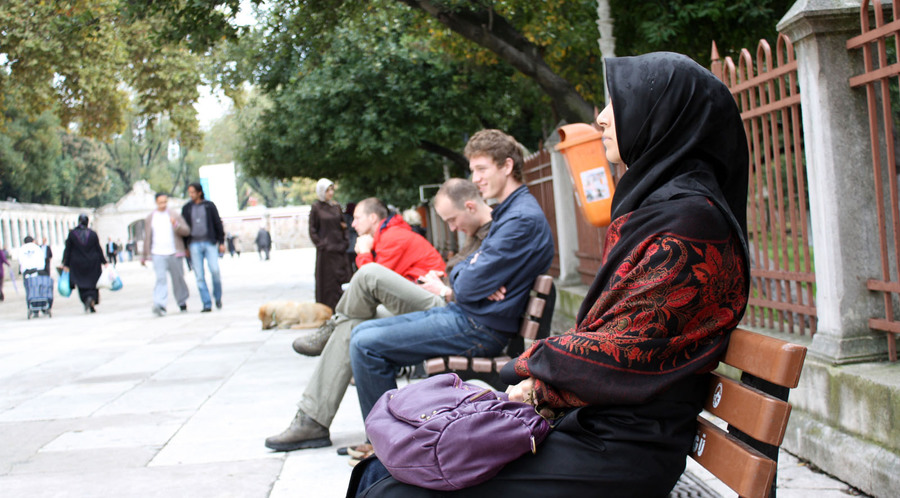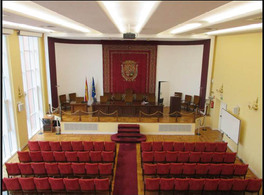Conferences and debates
Index / Activities / Conferences and debates / Models of society, stereotypes and Islamophobia in Europe
Models of society, stereotypes and Islamophobia in Europe
May 31, 20167:00 p.m.
MADRID
Casa Árabe Auditorium (at Calle Alcalá, 62).
7:00 p.m.
Free entry until the event’s capacity is reached.
In Spanish.
Presentation of the latest reports on Islamophobia in Spain at a round table discussion that will analyze the situation across Europe
To mark the end of the course “Islam and Muslims Today: Fundamentals, diversity and relations with Spain,” organized by Casa Árabe and Spain’s Diplomatic School, the results of two reports on Islamophobia in Spain will be presented at a round table discussion on Models of society, stereotypes and Islamophobia in Europe. At the presentation, we will analyze the situation within the European context along with experts and research centers which specialize on this subject.
Participating in the round table discussion will be Alfonso Casani, a researcher with the Islamic Culture Foundation (FUNCI), who will be presenting the results of a report titled “Islamophobia in Spain. National Report 2015,” published in April 2016; Jordi Moreras Palenzuela, a professor of Anthropology at the Universidad Rovira i Virgili in Tarragona and a specialist in Muslim communities and Islamic associations and organizations in Catalonia and Europe; Ángeles Ramírez Fernández, a professor of Social Anthropology at the Universidad Autónoma de Madrid (UAM) and a specialist on gender and Moroccan immigration in Spain; and Riay Tatary Bakry, president of the Islamic Commission of Spain (CIE), who will be presenting the results of the Islamophobia Report of 2016, completed by the Observatorio Andalusí of the Union of Muslim Communities of Spain (UCIDE), to be published in upcoming weeks.
After the round table discussion, the course will be officially closed by the General Director of Casa Árabe, Pedro Villena, along with the Ambassador-Director of the Diplomatic School, Enrique Viguera. They will then proceed to give out the diplomas.
The report on Islamophobia in Spain. National Report 2015, completed by the FUNCI, is the chapter on Spain forming part of the report on Islamophobia in Europe, the European Islamophobia Report 2015, coordinated and published by a Turkish research center, the Foundation for Political, Economic and Social Research. According to this report, despite the belief that Islamophobia is not a problem in Spain, over the last twelve months, the number of Islamophobic attacks reported has increased four-fold. The aspects which are most important to be able to understand the spread of this type of discrimination in the country are, first and foremost, the existence of a series of prejudices of a historical nature against “Moors,” stretching back to the period of Al-Andalus and the Reconquista, as well as the times of political tension that Spain is now experiencing, the uprise of terrorism by the so-called Islamic State and the Syrian refugee crisis, all of which are having a considerable impact on the situation for the Muslim populations throughout Europe. The report analyzes the existence of Islamophobia in different realms within the country, including the education system, the media and the justice system, and the development of an anti-terrorism policy.
The 2016 Report on Islamophobia is an annual report published for over a decade by the Observatorio Andalusí, an entity created by the UCIDE as an institution for the observation and tracking of the Muslim population’s situation and Islamophobia in Spain.
Further information:
Alfonso Casani Herranz, “Islamophobia in Spain. National Report 2015,” European Islamophobia Report 2015 (Foundation for Political, Economic and Social Research, 2016)
Informe sobre Islamofobia 2016 (2016 Report on Islamophobia, Observatorio Andalusí, published in the press)
Alfonso Casani Herranz is a researcher at the Islamic Culture Foundation (FUNCI). Author of the report Islamophobia in Spain: National Report of 2015, he is currently working on the project “Twistislamophobia“ by the FUNCI and has cooperated on its book Islam and Constitutionalism: An open dialogue. He is completing his doctorate at the Department of Arab and Islamic Studies and Oriental Studies at the Universidad Autónoma de Madrid and is a member of the International Mediterranean Studies Workshop research group (TEIM) and the Study Group on Arab and Muslim Societies (GRESAM).
Jordi Moreras is a professor and researcher with the Social Anthropology Department at the Universitat Rovira i Virgili in Tarragona. He has a PhD in Anthropology (Universitat Rovira i Virgili, 2009) and a Master’s degree in Euro-Arab Studies (University of Girona, 1993). From 1995 to 2001, he was the coordinator of the Migrations Area at the Cidob Foundation, and from 2002 to 2003, he was responsible for academics at the Religious Affairs Secretariat of the Autonomous Regional Government of Catalonia. He has written many books, reports and articles on Muslims, associations, places of worship and the organization of Islam in Catalonia and Europe. Amongst the most recent, one could highlight: “Guide for Managing Religious Diversity in Cemeteries and Funeral Services,” in guides for the public management of religious diversity, issue 8 (2013 );” (Un)follow the Leader: A critical reading on the leadership and Islamic movements in Europe”, Islam and Muslims Today: International dimension and relations with Spain (2013); “Spaces of Death and Religious Diversity: The presence of Islam at Catalonian cemeteries and funeral homes,” Estudis sobre el patrimoni etnològic de Catalunya nº 5, with Ariadna Solé (2014), and “Mussalas, Mosques and Minarets: Ethnography of mosques in Europe,” Awraq, issue nº 9 (2014).
Ángeles Ramirez Fernández is a professor of Social Anthropology at the Universidad Autónoma de Madrid (UAM) and an associate researcher with the International Mediterranean Studies Workshop (TEIM) who also forms part of the Anthropology Research Group for Public Orientation at that university. With a PhD in Social Anthropology (UAM, 1997) and a bachelor’s degree in Philosophy (UAM, 1987), she has worked on the topics of gender and Moroccan immigration, feminisms, social movements in North Africa, associationism in Morocco, the social participation of women, and Islam and immigration. She has completed field work in Morocco and Spain, with a few forays into Algeria and France. Her research focuses on four fundamental matters: migrations from North Africa; the relationships between culture, power and representations; the dynamics of feminisms and social movements and women’s rights in the Muslim world. Her latest publications include the following: “Muslim Feminism: Historia and debates,” in Teoría feminista y Antropología (2013); The Veil’s Trap: The debate over the use of the Muslim scarf (2011), and “Muslim Women in the Spanish Press: the Persistence of Subaltern Images,” in Muslim Women in War and Crisis: Representations and Reality (2010).
Casa Árabe and the Diplomatic School


